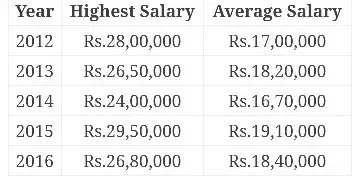In recent years, India has emerged as a global hub for Information Technology (IT) services, with its skilled workforce and competitive market positioning. A crucial aspect that professionals often contemplate is the remuneration they receive in this dynamic sector. Understanding the nuances of IT salaries in India is vital for both job seekers and employers alike.
Factors Influencing IT Salaries
Several factors play a pivotal role in determining IT salaries in India. These include:
1. Skill Set and Experience
Professionals possessing niche skills and extensive experience typically command higher salaries in the IT industry. Technologies such as artificial intelligence, cloud computing, and cybersecurity are currently in high demand, leading to lucrative compensation packages for experts in these domains.
2. Location
Salaries in the IT sector can vary significantly based on the geographical location within India. Metropolitan cities like Bengaluru, Hyderabad, and Pune often offer higher remuneration compared to tier-2 or tier-3 cities due to factors such as cost of living and demand-supply dynamics.
3. Company Size and Reputation
The size and reputation of the employing organization also impact IT salaries. Established multinational corporations and top-tier IT firms tend to offer more competitive compensation packages compared to smaller companies or startups.
4. Educational Background
Candidates with relevant educational qualifications from prestigious institutions often receive higher salary offers. Advanced degrees, certifications, and specialized training programs can further augment earning potential in the IT sector.
Trends in IT Salaries
The IT industry in India has witnessed several noteworthy trends concerning salary structures:
1. Rise of Remote Work
The global shift towards remote work has influenced IT salary trends in India. With organizations embracing remote and hybrid work models, professionals now have the opportunity to negotiate for competitive salaries regardless of their location within the country.
2. Emphasis on Skill Upgradation
In response to rapid technological advancements, there is a growing emphasis on continuous skill upgradation among IT professionals. Companies are willing to offer higher salaries to individuals who exhibit a commitment to learning and staying updated with the latest industry trends.
3. Demand for Specialized Skills
As digital transformation accelerates across industries, there is an increased demand for professionals with specialized skills. Roles such as data scientists, cybersecurity experts, and full-stack developers often command premium salaries owing to their scarcity and high demand.
Conclusion
Navigating the landscape of IT salaries in India requires a nuanced understanding of various factors influencing remuneration packages. By staying abreast of industry trends, honing in-demand skills, and leveraging negotiation tactics effectively, professionals can secure lucrative opportunities in the dynamic IT sector. Employers, on the other hand, must adopt competitive compensation strategies to attract and retain top talent in an increasingly competitive market. As the IT industry continues to evolve, staying adaptable and proactive remains paramount for both professionals and organizations alike.



